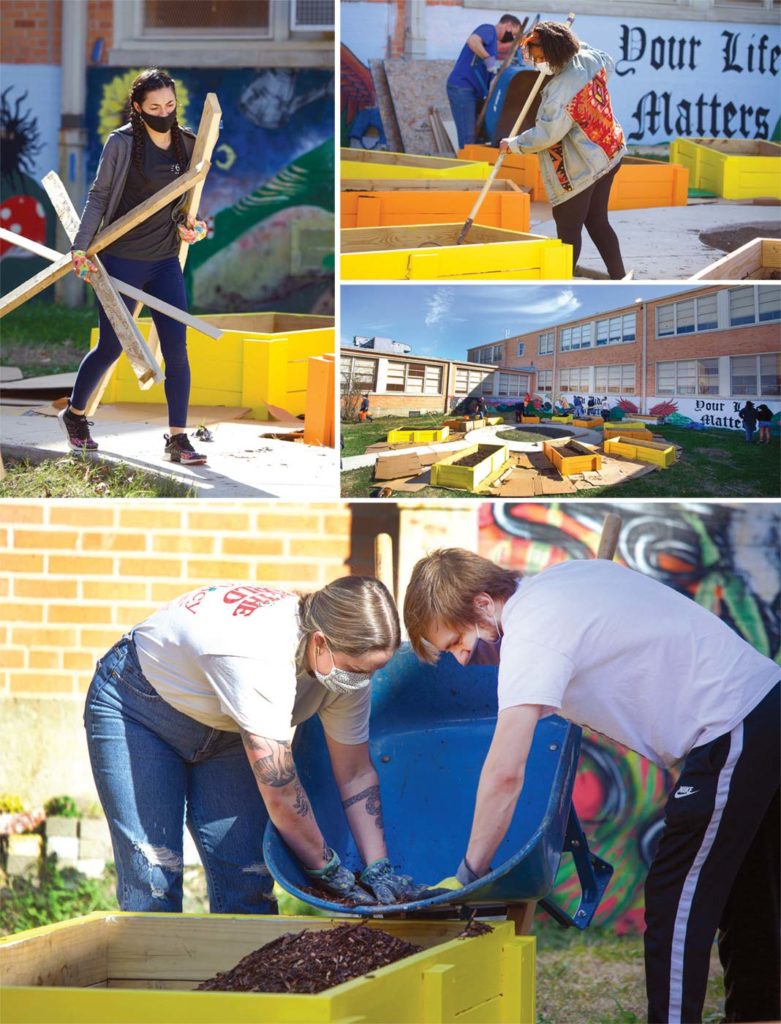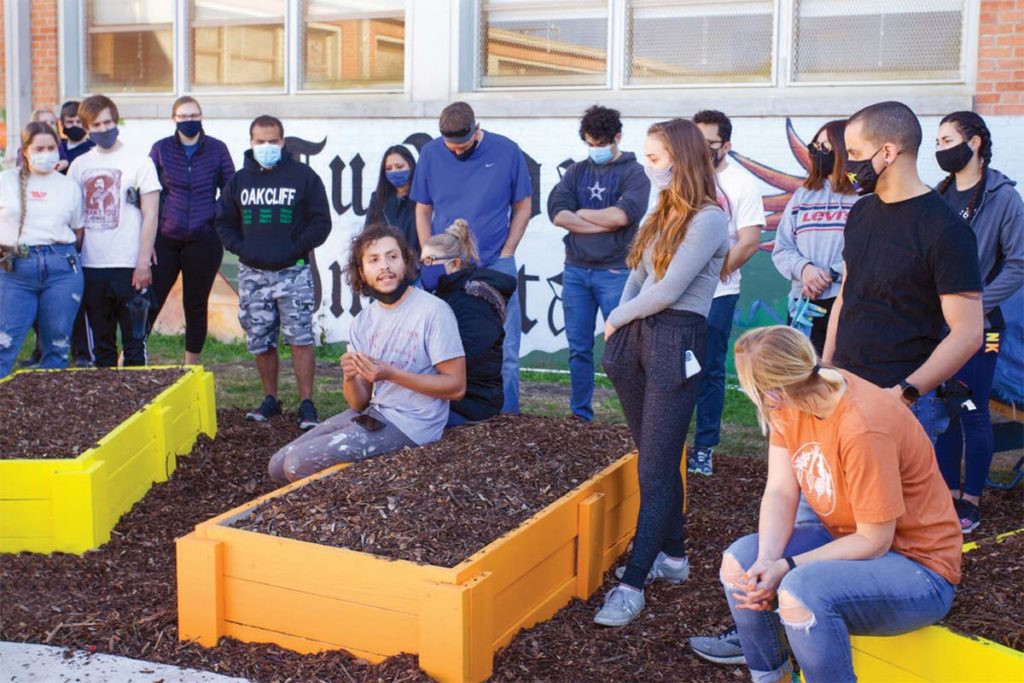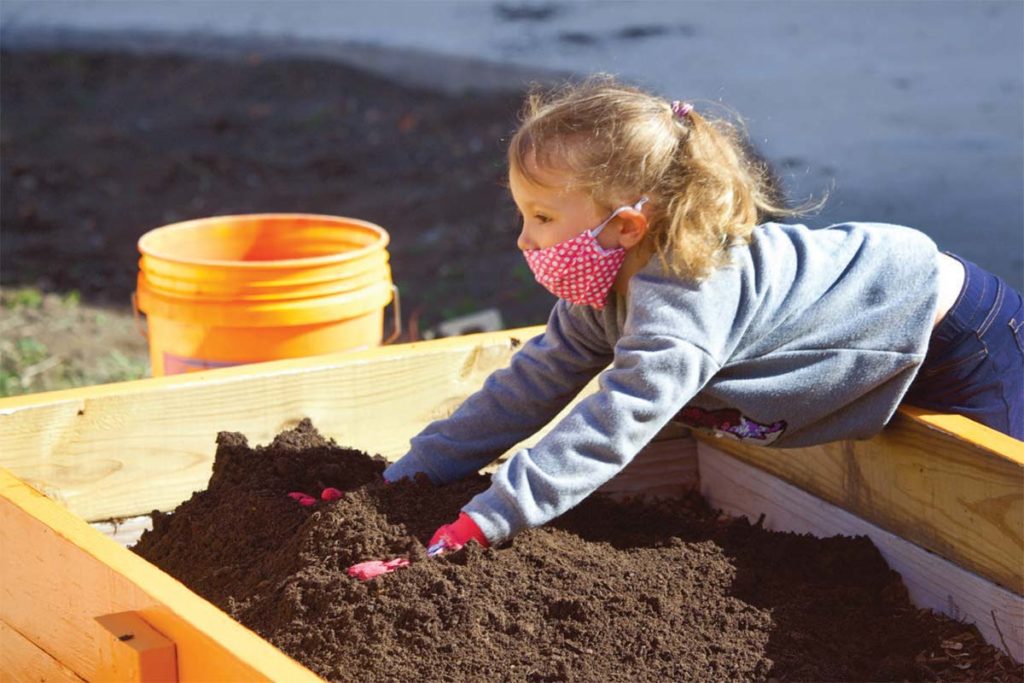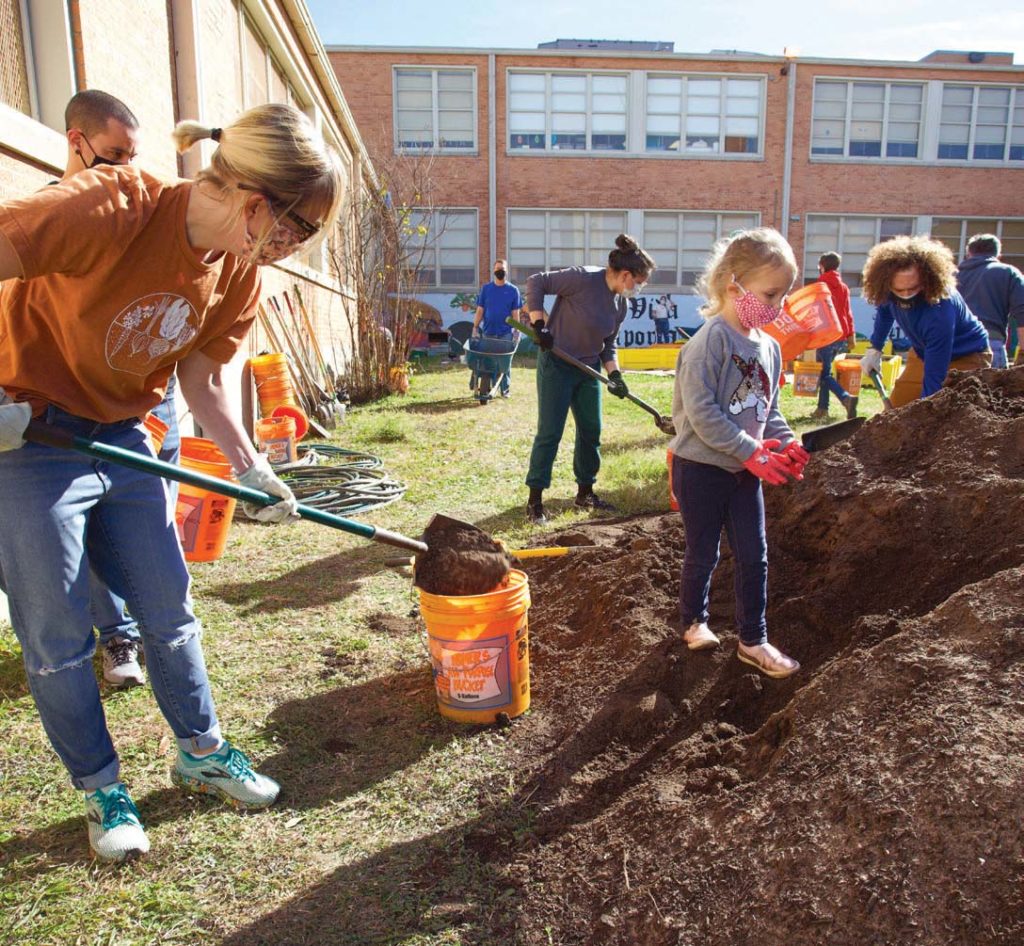Photography Russ Aman

Throughout the pandemic, millions of Americans have found comfort, resilience and a re-connection to the awe of discovering nature’s wonder. Kim Aman (or, as her students know her, Farmer Kim) is the seventh-generation farmer that in addition to teaching future generations lessons from the garden, is also cultivating resources to help community leaders and educators to do the same.
Planting the Seed
“After 30 years of public school teaching, I am living the dream, educating school communities about the importance of caring for the environment, themselves and each other. I got started in school gardens because I was that teacher who embraced unconventional teaching practices and took my students outside to learn as often as I could,” says Aman.
Working with a group of parents, a decade ago, Farmer Kim launched the nationally recognized school garden Moss Haven Farm at Moss Haven Elementary in the Lake Highlands neighborhood of Dallas.
Putting the garden into kindergarten, each student receives 30 minutes of edible education every week, tied into their grade-level curriculum, throughout their 6th-grade year.
“We have 23 raised beds, a pocket prairie, native area, giving garden and a chicken coop with 17 hens,” says Aman. The giving garden has produced over 10,000 pounds of food in the last 10 years that was donated to the North Texas Food Bank.
Their 4H club shows these chickens at the State Fair of Texas each year and for the last 3 years, they’ve incredibly won “best egg” in the state!
The curriculum that Farmer Kim has developed is about more than using the outdoors as a backdrop, or hands-on tool for incorporating math, science and history lessons. Perhaps one of the most life-changing and life-giving lessons… is cultivating a taste for healthful vegetables and fruits.

School Garden to Table
In North Texas and throughout the state, diet-related childhood obesity is a “growing” problem, one that Farmer Kim believes can be alleviated through more time spent growing food gardens and hands-on learning about what a healthy diet looks like.
“Texas ranks number 48 in the nation on a list of healthy kids in America. There are 10-year-olds in DFW with Type 2 Diabetes, a disease that historically occurs in middle-aged and older people after a lifetime of eating poorly. We want to grow healthy kids and a healthy planet. All kids benefit from school gardens. Kids who have everything to kids who have little. School gardens help grow a healthier generation of people,” says Aman.
In addition to the countless hours spent teaching kids about caring for the environment and healthy eating, Farmer Kim has been growing a network of like-minded volunteers, businesses and non-profits that share her passion.
“We have formed partnerships with the American Heart Association, Whole Kids Foundation, Slow Food DFW, Texas Master Gardeners, The Cooper Institute, North Texas Food Bank and Grow North Texas,” says Aman.
North Texas School Garden Network (NTSGN)
As the chair of the North Texas School Garden Network, Aman is helping to connect and share resources to other garden leaders around the region with the help of a Farm to School grant from the USDA, and support from Grow North Texas and The Seed Project Foundation.
“This Network has grown out of the Pandemic. Our plan was for in-person learning, but we had to shift and rethink. I have learned through my school garden journey, that there is huge value in connecting with other school garden educators,” says Aman.
But rather than solely providing online training for those involved with school gardens, Aman has partnered with LatinX Dallas, The Oak Cliff Veggie Project, Slow Food DFW and Feed the Revolution to build a network– to support and learn from each other, season after season.
“If you want to go fast, go alone. If you want to go far, go together. Through the NTSGN, we hope to grow deep, strong roots in school gardens across our region,” Aman added.

Free Resources for Parents, Teachers, Students and Garden Volunteers
School Garden Toolkit — a culmination of all the best school garden resources, located in one place including how-to’s, planting calendars, curriculum connectors, grants and online resources available to anyone.
Virtual (for now) Field Trips — Highlighting a different school garden program, their best practices, and with a focus on community building. See the upcoming programs by searching “NTX School Garden Network” on Facebook and Instagram.
Grow Garden Grow
Farmer Kim, thanks to the help of The Seed Project Foundation, is also now spearheading the Grow Garden Grow initiative, through the Organization GROW North Texas. With over 75 years of experience between them, their team works closely with garden leaders, teachers, administrators and school districts, and are rooted with an understanding of how children learn, how schools operate and the importance of connecting academic objectives.
This program helps provide financial resources for schools trying to develop a truly sustainable model. The Grow Garden Grow grant program comes with a small stipend but schools are also guided through additional grant writing—for additional funding to support their goals.
Six of the current Grow Garden Grow grant-supported schools are listed as Title 1 Schools housed in areas with extremely limited financial resources. The program’s goal is to double that number every year, increasing edible garden resources in many of the North Texas neighborhoods that need it most, and helping building programs where teachers and students are guided to use the garden with comprehensive hands-on training and support.
“The grant schools receive a mentorship that offers garden team building support, teacher training, co-teaching & modeling, community connections, local resources, grant support, and sustainability planning. We take them from where they are and help them grow to where they want to be, using goals that the school designs,” says Aman.
“Every school has the capacity to grow a garden, however, they look different on every campus. They are relatively easy to start, but thrive if they have a plan to carry them through year after year,” says Aman.
You can support Grow Garden Grow’s mission to assist 6 more Title 1 schools by helping build and support their school garden program. Tax-deductible donations can be made at https://grownorthtexas. org/Donate and designating “Grow Garden Grow” in the comment box.

Your Donation Can Fund:
$15 Seeds
$30 Transplants
$75 Containers, compost, and organic fertilizer
$150 Basic set of garden tools
$250 3 raised beds with garden soil
$350 12 hours of educational workshops and garden support
$1000 3 months of garden coaching, consult, and support for a school garden program
$3,000 1 year of garden support, consult, and support for a school garden program
Daniel Cunningham, Horticulturist with Texas A&M AgriLife's Water University program. His primary focus is a holistic approach to landscaping and food production systems. Cunningham specializes in Texas native plants and trees, vegetable gardening, edible landscaping, rainwater harvesting and is passionate about utilizing landscapes as habitat for benecial wildlife. For more gardening advice om Daniel, tune in to NBC DFW (Channel 5) on Sunday mornings or ask @TxPlantGuy on Facebook, Twitter or Instagram.
- Daniel Cunninghamhttps://www.edibledfw.com/author/dcunningham/
- Daniel Cunninghamhttps://www.edibledfw.com/author/dcunningham/
- Daniel Cunninghamhttps://www.edibledfw.com/author/dcunningham/
- Daniel Cunninghamhttps://www.edibledfw.com/author/dcunningham/









